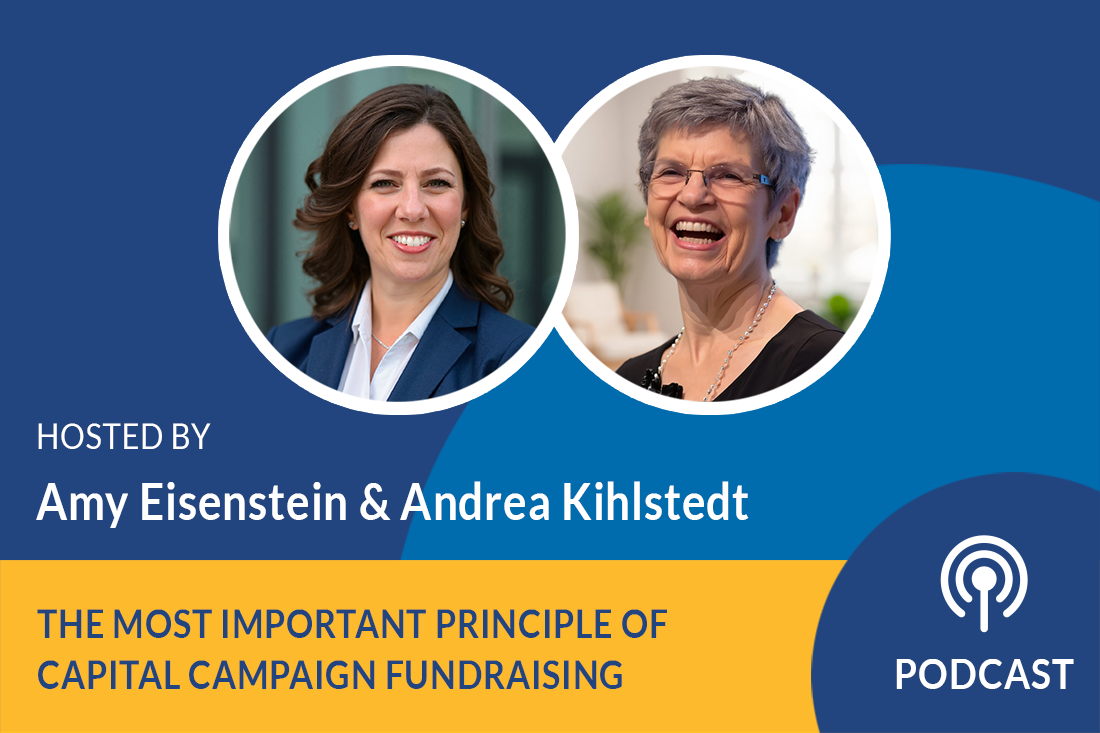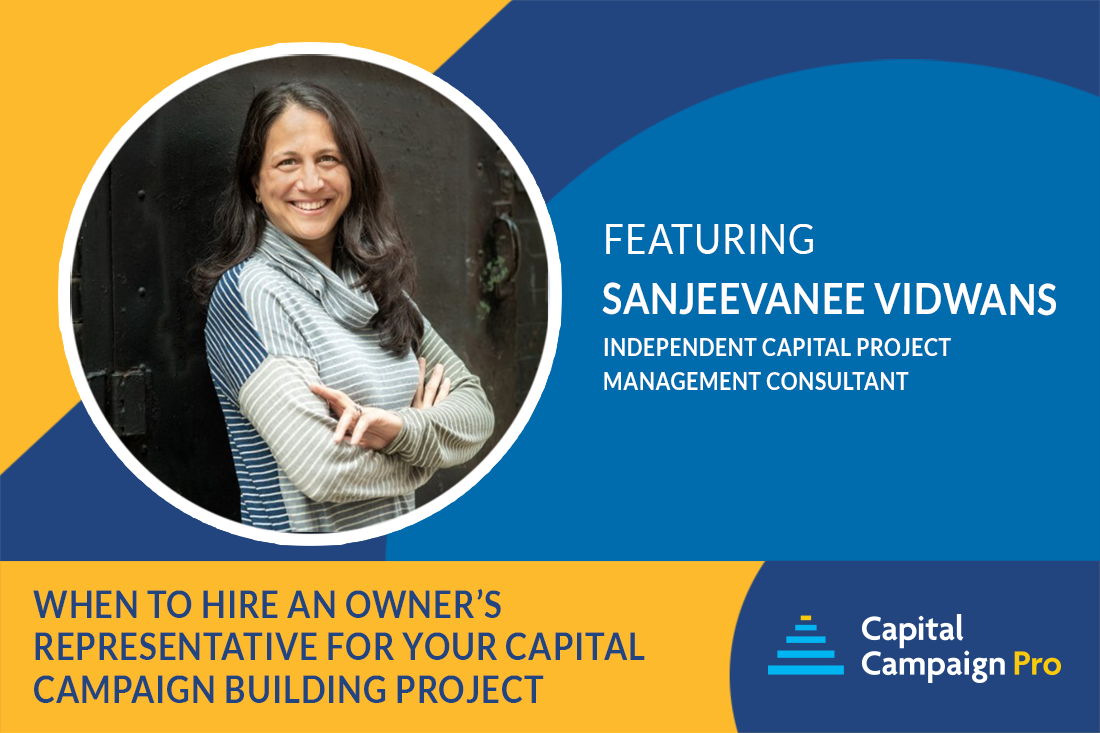Podcast: Staffing Up for Your Capital Campaign

Season 2, Episode 50
Campaign experts Amy Eisenstein and Andrea Kihlstedt help you figure out what you need in order to make enough time for a successful campaign. They discuss when and how to staff up.
Listen Now:
This podcast is the sixth of a special Summer Series of conversations on important fundraising topics. Our live webinars will return on September 12, 2022; learn more at ToolkitTalks.com.
Amy Eisenstein:
Do you feel like you need 48 hours in a day? You’re already working a zillion hours a week and now you’ve got to run a capital campaign. You may be wondering how to convince your boss and board members to staff up for a campaign. That’s the question we’ll address in today’s podcast.
Hi, I’m Amy Eisenstein and I’m here with the co-founder of Capital Campaign Pro and my colleague, Andrea Kihlstedt. Andrea, why don’t you get us started on today’s topic.
Andrea Kihlstedt:
Great. Thank you, Amy. I’m happy to be here with you today. So here’s the way I’d start today’s topic and it’s really to ask you, who are listening if you sit around your office and twiddle your thumbs. Or if you’re working like mad. Because if you’re not on a campaign and you’re working like mad just to bring in your funding for the annual fund, which I suspect you are, then you might well wonder how in heaven’s name you’re going to manage a capital campaign on top of that.
Right. It always makes me laugh to think board members or maybe your boss thinks you can manage a campaign on top of the annual fund. I do wonder, do they think you’re sitting around twiddling your thumbs? No. If you’re going to raise five or 10 times what you normally raise for your annual fund, it’s obviously going to take additional staff and resources. So let’s think more about that.
A Capital Campaign is a Great Opportunity to “Ramp Up”
Andrea Kihlstedt:
Okay. Now there are a couple of things that I think are really important to know. First of all, a capital campaign is a wonderful time to actually ramp up, to hire people. Why?
First of all, because in your campaign, you’re going to be raising a whole lot more money than the organization is used to raising. Your staff, your board and executive director are likely to think kindly on hiring additional staff. I mean, it’s not like you’re just going to be raising the same amount of money. This is an investment with serious returns. So this is a great time.
Second of all, your campaign is going to have a budget for how much it takes to raise that kind of money. In your budget, there should be a line item for staffing up. So that line item doesn’t have to come out of your regular operating budget. Again, it’s going to make your executive director, your treasurer, your board members feel a whole lot more comfortable with the idea of bringing on additional staff.
Working Within Your Campaign Budget
Amy Eisenstein:
Yeah, let’s dig a little deeper into that idea of a campaign budget.
So if you are planning your campaign and you are hoping to raise let’s say $10 million just for a round number, then you want to think about a campaign budget, approximately as 10% of your campaign goal. Often it’s less, but let’s be conservative and say 10%. So you’re going to have a campaign budget over two or three years, the life of your campaign of $1 million and that is to help you raise the money.
So ultimately your goal may have to be $11 million. $10 million is what you want to raise for your project, and your programs and your services, but you need to raise an additional million dollars, 10% in order to pay for some campaign expenses. That’s what we’re talking about in terms of a campaign budget and that’s where your initial outlays for new staff, additional staff will come from. So let’s talk about what types of staff organizations should think about bringing on to help with the campaign.
Andrea Kihlstedt:
Wait a minute Amy, before we do that, I just want to be really clear that we are not saying that that million dollars is all going to go to staff. You’re going to have a whole bunch of campaign expenses. Staffing is one of the campaign expenses. So I don’t just don’t want to mislead.
Amy Eisenstein:
Great yes.
Andrea Kihlstedt:
About that.
Amy Eisenstein:
Yes. It’s going to pay for donor recognition. It’s going to pay for consulting. It’s going to pay for donor events and activities.
Andrea Kihlstedt:
It’s going to pay for all kinds of stuff, but in that there will be a line for staffing up to make your campaign happen.
Amy Eisenstein:
Right. Thank you.
Assigning Workloads to Staff with Respect to Your Campaign
Andrea Kihlstedt:
Now, how do you think about staffing up? So when you learn about campaigns, what you’ll find out and perhaps you already know, is that your campaign starts out quite narrow. In the whole first several phases of the campaign you are focusing entirely on those top 20 or 30 gifts that are going to cover the top 50 or 60% of your campaign goal.
Now it is really, really helpful to have people on board for that part of the campaign, but what you really want them to help with is to take the non-significant work off the desk of your executive director of your key development people so that they can focus on raising those largest gifts.
Now, as your campaign goes on and broadens as you’re reaching out to more and more people, it’s going to take more and more administrative work and support to make your campaign happen. But in the beginning, what you’re trying to do is to make sure your executive director, head development officer, other key development people have the ability and the time to focus on what’s most important, and that’s those top gifts from those relatively few donors.
Amy Eisenstein:
Yep. So you might be thinking about hiring an administrative person. You might be thinking about hiring a campaign manager. There might be other hires, but initially it’s really to help support the executive director to get out there and meet with those top donors. That’s what you need to think about hiring for.
When to Hire a Campaign Manager
Andrea Kihlstedt:
Now as the campaign moves forward, you’re going to find that it will take more and more effort, more and more energy to actually staff all of the committees for the campaign to work on all of the publicity and public relations that needs to happen, to pull together community groups. I mean, there will be a lot of broad-based work to deal with all of the social media that will be associated with your campaign.
So at some point you really will want to hire what you might think of as a campaign manager, but many organizations don’t hire a campaign manager right in the beginning. They’ll do that as the quiet phase or the lead gift phase of the campaign gradually moves ahead. That’s when they’re going to start working on finding just the right person for that spot. So that by the time they kick off the public phase of the campaign, they actually have someone who can manage that whole public phase.
Amy Eisenstein:
Right. There’s more communication, there’s more donor events, there’s more activity, there’s more fundraising efforts, broad based fundraising efforts that have to take place. So that’s a great role for a campaign manager.
Andrea Kihlstedt:
That stuff can eat you alive. I mean, it’s incredibly time consuming. Take someone with great organizational skills, someone who can manage details well, someone who communicates well, that’s an incredibly important position. So you should be thinking about it, but you shouldn’t worry about being fully staffed up right in the beginning of the campaign, because in the very start that’s not what it’s going to take.
Amy Eisenstein:
Listen, I just want to remind listeners that if you wish your boss or a key board member or two could hear this directly, I want you to head over to Capital Campaign Pro website and sign up with us for a free strategy session. Because Andrea or I, or one of our team members would be more than happy to explain how this works, why this works, where the funding comes from. So we’d be happy to speak to you and your boss about how to get ready for a campaign to staff up and answer any questions you have. So again, head over to Capital Campaign Pro website and sign up for a free strategy session so that we can just talk about your specific needs and help explain this to your boss.
Staffing Your Campaign for Capacity Building
All right. So, Andrea, I don’t want to wrap up this conversation until we talk about the idea that campaigns are really at their core for capacity building. So hiring additional fundraising staff potentially for short term for the duration of your campaign, but ideally that you would be able to raise up your whole fundraising effort and keep them past your campaign and move them into permanent fundraising position is a really important concept. So you could think about these positions as short term campaign only two year type of positions, but how do people think even bigger past the campaign?
Andrea Kihlstedt:
Well, I think you raised a really important point, Amy, that once an organization has raised 10 times the amount of money they’ve ever raised, once they’ve moved into a new building, once they’ve expanded their programming, once they’ve actually reached out and expanded their annual recurring fundraising, they will not only need but be able to hire additional fundraising staff. If the people they’ve brought on for a campaign are a good fit, and they already know their donor base, and they already know their systems, then they’re going to want to see if they can’t just slide those people over to the ongoing operating budget. Now that doesn’t always happen, but when it happens, that’s the ideal.
Amy Eisenstein:
Yeah. So I just want to plant the seed. Initially these additional fundraising hires will be paid out of the campaign budget, but if after a year of working with them, you do hope to keep them in the future you may think about gradually transitioning their salaries from the campaign budget to your annual fund budget. So in the second or third year of your campaign you might pay two thirds or half their salary from the campaign budget and start to pick up a piece of their salary in the annual fund budget. So at the end of the campaign, it’s not such a shock to the annual operating budget when you transition that person over, if you’re going to keep them. So I just wanted to plant that seed.
Final Thoughts: 3 Key Points
All right. Any final thoughts about hiring and staffing up for a campaign before we wrap up?
Andrea Kihlstedt:
I think we should just make the three key points really clear, Amy.
- If you are going into a campaign and you’re going to be raising five or 10 times the amount of money you’ve ever raised before, you’re not going to be able to do that just with wishful thinking. You’re going to have to hire people to help you make that happen. That’s just reality. It’s super-duper important.
- The cost for additional staffing for your development office doesn’t have to come out of your annual fund, annual operating budget. It can come out of a special campaign budget. Because of that, you actually will be raising that money through your campaign. That’s going to make hiring additional people far more palatable to your executive director and your board chair.
- Campaigns are all about building capacity and as your organization grows through the campaign, you may be able to take those capital campaign staffing positions and actually slide them over one or two or three years so that they are covered by your annual operating budget as your operating budget grows.
So this is an exciting time. You should take full advantage of the opportunity to hire additional staff people. If you do that strategically and carefully, you’re likely to end up a much stronger development jump.
Amy Eisenstein:
Yes, I think that’s exactly right. A capital campaign, the whole point is capacity building for your entire organization. Not just building a building, but growing all of the programs and services, and that includes operations and development. So this is a perfect opportunity and excuse really for you to staff up.
All right. If you want to learn even more about capital campaigns, and free resources and ways that we might help go to the capitalcampaignpro.com website. You can even sign up for a free strategy session to discuss the specific needs of your campaign and get all of your questions answered. Thank you for joining us and see you next time.



Leave a Comment